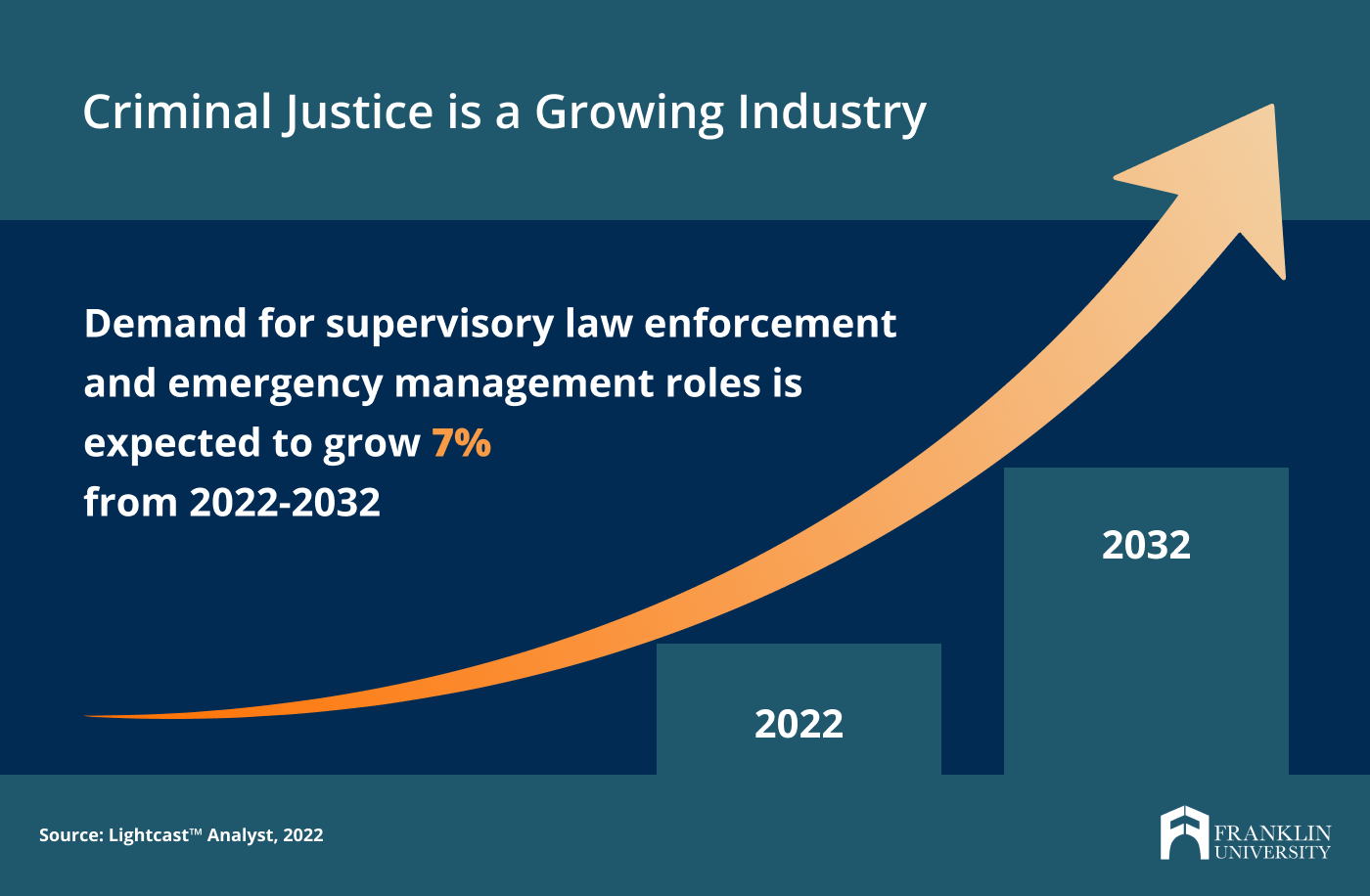Request Information
We're Sorry
There was an unexpected error with the form (your web browser was unable to retrieve some required data from our servers). This kind of error may occur if you have temporarily lost your internet connection. If you're able to verify that your internet connection is stable and the error persists, the Franklin University Help Desk is available to assist you at helpdesk@franklin.edu, 614.947.6682 (local), or 1.866.435.7006 (toll free).
Just a moment while we process your submission.

Is a Master's in Criminal Justice Worth It?
Every society has its share of crime—and that means every society needs a criminal justice system run by skilled professionals. That is especially true today amidst rapidly evolving challenges, including cybercrime and the international drug trade.
These changing issues mean that the field desperately needs highly educated professionals who understand the causes and correlates of crime and can apply their knowledge to create new approaches and solutions.
From 2022-2032, jobs in police supervision and emergency management are expected to increase by 7%, and a master’s degree in criminal justice can help you stand out while applying for these jobs, especially higher-level positions.

What Are the Benefits of a Master's in Criminal Justice?
Whether you’re just getting started in the criminal justice field or have already risen through the ranks, a criminal justice master’s degree offers numerous benefits. These include:
- Understanding the diverse perspectives that make up the criminal justice system, including citizens, victims, the community, law enforcement and the courts
- Deepening your knowledge of critical and emerging issues in the criminal justice system, including justice reform efforts
- Developing the tools to lead through complex, high-pressure situations
- Learning how theories of crime prevention apply to real-world cases
- Developing skills in advanced policing, intelligence analysis, penology, victimology and more
Thinking about applying for grad school? Get an inside look at how to create a winning admission essay with this free report.
Beyond developing your knowledge, a master’s degree in criminal justice can also offer tangible career benefits.
“A master’s degree in criminal justice teaches skills that will prepare students for leadership positions in law enforcement, the court system or corrections,” said Dr. Chenelle Jones, chair of public safety programs at Franklin. “Individuals with a master’s degree have a competitive edge over job candidates that only have a bachelor’s degree.”

What Can You Do with a Master's in Criminal Justice?
A master’s degree in criminal justice offers excellent preparation for students for advancement in local, state and federal systems. It also qualifies graduates to teach at the community college level.
Jobs available with a master’s in criminal justice include the following. For federal positions, it’s important to note that listed starting salaries can translate to much higher actual wages once locality pay, availability pay and overtime are considered. In some agencies, a graduate degree also results in a bump up the salary scale.
Sheriff
The specific duties of a sheriff vary significantly depending on locality. Typically elected at the county level, in some jurisdictions, sheriffs hold a similar role to a police chief, while in others, their mandate is more limited. They are also often responsible for overseeing local jails. Salaries in this role vary significantly based on the county's size and the position's scope.
- Median advertised salary: $40,800 (Lightcast)
*Note that sheriffs are elected in many jurisdictions, meaning their salaries will not appear in job posting databases.
Criminal Investigator
Criminal investigators (or detectives) work as part of a law enforcement team investigating suspected crimes. They may operate at the local, state or federal level and collaborate with other law enforcement professionals, such as forensic investigators.
- Median advertised salary: $78,200 (Lightcast)
FBI Agent
Agents for the Federal Bureau of Investigations (FBI) conduct investigations and perform law enforcement duties at the federal level. FBI agents can be posted to field offices around and outside the United States. Often, FBI agents are involved in investigating organized crime, online crime and interstate issues.
- Starting salary for training: $53,593 plus locality and availability pay; most agents earn over $80,000 plus locality pay within five years (FBI)
DEA Agent
Agents for the U.S. Drug Enforcement Administration (DEA) investigate federal drug crimes and work to combat drug trafficking and distribution. They partner with other law enforcement agencies, including internationally, to protect communities from drugs and traffickers. DEA agents can be posted around the United States and in other countries.
- Starting salary for training is $47,097 plus locality and availability pay; most agents are paid over $80,000 plus locality pay within five years (DEA).
ATF Agent
Agents for the Bureau of Alcohol, Tobacco, Firearms and Explosives (ATF) investigate violations of federal laws surrounding firearms and the trafficking of firearms, explosives, alcohol and tobacco. They work closely with other law enforcement agencies. ATF agents can be posted around the country and even overseas.
- The starting salary range for an ATF agent is $37,512 to $61,443 before locality and 25% availability pay. A master's degree can increase an ATF agent’s starting salary and promotion potential (ATF).
Probation Officer
Probation officers work with offenders who have been put on probation or parole. Their role is to protect the community and ensure that the offender is not a danger and help the offender in their rehabilitation efforts.
- Median salary: $60,250 (Bureau of Labor Statistics)
Criminal Justice Instructor
A criminal justice instructor teaches students about law enforcement and the criminal justice system, often at the community college level. Many law enforcement professionals choose to become criminal justice instructors in their retirement.
- Median advertised salary: $61,600
Court Services Supervisor
A court services supervisor oversees a court’s staff and ensures that all court proceedings are carried out efficiently and safely. They are responsible for keeping the court’s records, budgets, IT operations and more in compliance with local, state and federal regulations.
- Median advertised salary: $69,400 (Lightcast)
Criminal Intelligence Analyst
Criminal intelligence analysts work within law enforcement teams to collect and analyze data about criminal behavior. They may gather and analyze intelligence about potential threats and use statistics to identify areas of criminal concern. Ultimately, this data can be used to halt crimes and prevent future ones.
- Median advertised salary: $60,200 (Lightcast)
Police Chief
A police chief oversees the operations of a police department and manages the performance and deployment of officers to crime scenes and investigations. They generally have a public-facing role, interfacing with members of the community and managing communications about crime and safety issues.
- Median advertised salary: $114,800 (Lightcast)
Emergency Management Director
Emergency management directors work for local or state governments or organizations like universities or hospitals to plan and prepare for emergencies and natural disasters. When these incidents occur, they coordinate the response to protect individuals, communities and property.
- Median advertised salary: $85,900 (Lightcast)
Is a Master's in Criminal Justice Worth It?
For many professionals, a master’s degree in criminal justice can offer significant personal and professional payoffs. Especially in the state and federal systems, having a graduate degree provides an advantage in hiring decisions. Many government jobs have salary scales that automatically bump graduate degree holders to higher pay levels, meaning that a master’s degree in criminal justice can offer significant financial benefits.
While this degree is an excellent option for those entering the criminal justice field, it also opens up new possibilities for more advanced professionals. Many students enroll in a master’s in criminal justice to prepare to teach at the community college level after they retire from active law enforcement service.
Take Your Next Step with a Master's in Criminal Justice
Are you eager to start or develop a challenging, engaging career in the criminal justice field? Franklin University’s master’s in criminal justice offers flexible options to help you make your next move. You can complete your master’s in criminal justice online in as few as 14 months without sacrificing your professional obligations. As part of the degree program, you’ll earn Franklin University’s Graduate Certificate in Criminal Justice Leadership, a four-course qualification that requires no extra time or tuition and helps you build knowledge that can be put to use right away.
“Franklin’s program embraces a theory-to-practice approach that prepares students for real-world application of the knowledge they acquire throughout the program,” says Jones. “Courses are taught by instructors who have a good balance of academic and practical experience in law enforcement, courts and corrections.”
Learn more about Franklin’s master’s degree in criminal justice administration and how we can help you move toward your career goals.





